
For the past month I've been working in a town some 35 miles from where I live. It's not a massive distance by any means, and I really didn't think that commuting from one major conurbation on the south coast of England to another would be an issue when I took up the offer of employment. A quick car journey every day - easy right? Well no, actually.
Because the road network in this part of England is an absolute joke and roadworks on the Roman routes that make up the main arteries are an almost constant fixture (and last for months/years at a time), I have been forced to use rail travel for the past five weeks. I initially thought it would be quite good to get the train to and from work because it would give me time I would have otherwise spent stuck in a traffic jam to do other stuff - read a book, play on my Vita or listen to/edit podcasts.
|
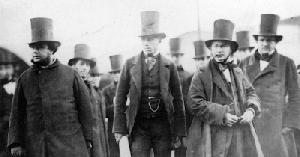 |
| The original Reservoir Dogs.
|
For the most part this has actually been the case, but on many, many occasions the trains have either been late, too crowded to find a seat on, or have been totally cancelled with no explanation. Naturally, this has lead to me grumbling on social media about how pathetic our train services are, but it got me thinking: how hard is it to run a train network and keep everything going smoothly? Thanks to the awesome power of the Dreamcast, I have the very tools at my disposal to find out in a measured and scientific manner. Ladies and gents, the train now approaching platform 3 is Railroad Tycoon II...
I should start this little mini review/essay with an admission - I'm actually fairly au fait with the history of the railways in the UK, being well versed in the exploits and endeavours of great engineers such as
Isambard Kingdom Brunel
and
George Stephenson
. I know what standard and narrow gauge tracks are, and I know potted histories of the
Beeching Axe
, the
London Underground
, and the origins of the
Channel Tunnel
. I also spend more time than is healthy reading up on oddities such as
Parliamentary 'ghost' trains
, and disused lines and stations. That's not to say I'm a train nerd or anything - I know sweet FA about types and models of train engines or anything like that. It's the actual history of the infrastructure that interests me for some reason. And for these reasons alone, you'd probably think a game like Railroad Tycoon II would be right up my district line (street). Well, yes and no.
|
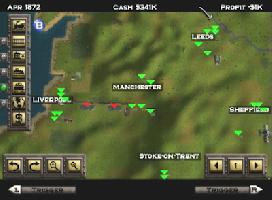 |
| Northern Powerhouse.
|
See, Railroad Tycoon II is a bit of an oddity on the Dreamcast. While it represents a taste of what many anticipated on the Dreamcast - i.e. a glut of PC to console ports - it kind of tries so hard to bridge the gap between the two markets that it totally misses the mark in both camps. It's far too simplified a version of the PC series (from what I can gather); yet it also manages to be a bit too complicated to appeal to the masses who bought a Dreamcast to play stuff like Crazy Taxi. And while I'm not for one second bashing Take Two Interactive/Gathering of Developers' decision to bring a relatively hardcore strategy title to a console like the Dreamcast, it's hard to see who Railroad Tycoon II was meant to appeal to.
But let us have a look at the good stuff contained here before laying in to this oft overlooked train 'em up. First off, it looks pretty damn good. The whole game world is modelled in 3D and features undulating hills, polygonal buildings, trees and little trains that chug along billowing smoke (in the early part of the game anyway - more on this later). The whole view can be spun around and zoomed in and out to your heart's content and this makes Tycoon somewhat easy on the eye. Likewise, the blues style music is very fitting for the frontier-era time frame that the game begins in, and the menus are all suitably 'industrial revolution' in aesthetic - indeed, the various FMVs and sound effects really do instill an air of the 1800s when you fire up the game.
|
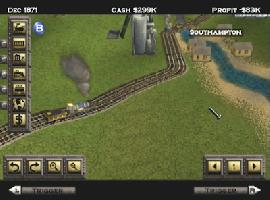 |
| Ploughing through the New Forest...at 12 mph.
|
Oddly though, this theme continues even if you're playing the game well into the 2000s and beyond (in-game time, you understand) so that's a bit strange. I was looking forward to the privatisation of
British Rail
while listening to some Britpop...but you can't have it all. There are plenty of play modes in Railway Tycoon II and most of them simply involve you trying to build a railway empire, connecting towns and cities across the world (the UK, Europe, America and Asia are all featured) and hauling passengers and cargo in the attempt to keep investors happy and ultimately turn a profit. You can build stations, lay different types of track, build bridges and purchase ever improving engines to service your network. It's all very Sim City, and if you're a fan of this genre then you'll certainly get some enjoyment out of balancing the books, looking into new cargo types to haul and opportunities to expand your network. As time progresses, so does technology and the option to electrify your routes and buy newer trains will also become available.
Unfortunately, Railroad Tycoon does have quite a few negative points that mar the experience somewhat. The control system is pretty horrendous and the way the cursor moves around the screen like it's been dipped in treacle will frustrate, and yet the lack of accuracy with which you can lay tracks will see you placing stuff in the wrong place almost constantly. Which doesn't sound like too much of a pain in the arse...until you realise that to correct any errors means bulldozing whatever you built, and that costs precious capital. Sometimes just placing a station, Command & Conquer style in the vicinity of a local town, will leave you wanting to throw the controller out the window because it simple will not line up on the invisible grid where you want it too. View controls too are stupidly confusing - you have to hold down the left trigger which activates the view menu, but the 'spin' and 'zoom' controls aren't mapped to the analogue stick as you'd expect - no, they're on the X, Y, A and B buttons. Unwieldy in the extreme, especially if one of your lines in another part of the map is in trouble and you have to get to it quickly.
|
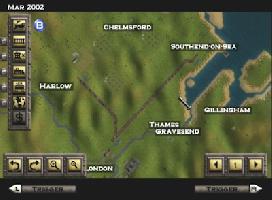 |
| Somewhere down south.
|
These are minor annoyances though and pale in comparison to the main problem I level at Railroad Tycoon II, which is that it's just a bit, well, boring. I know it's a game about trains and building a rail empire, but the lack of any real dynamism in the game's design really just makes it a bit of a chore to play. There are no advisers popping up to give their tuppence or any of the stuff that made Command & Conquer such a great game. If you had actors playing other tycoons with rival railroads popping up and giving you grief, it'd be a lot more enjoyable in my opinion. But it's just you, the bluegrass music (which is admittedly great) and the loneliness of the open savanna/desolate heathland being crisscrossed by your trains. Sometimes they make money, sometimes they don't. Sometimes it's pretty hard to decipher quite why through the myriad menus that present themselves any time you click one of the fairly confusing icons lining the screen.
|
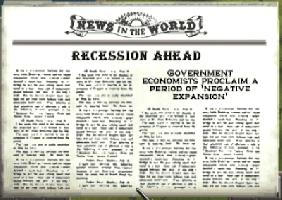 |
| Surprisingly accurate.
|
There is a lot of game here and the it spans several centuries of rail history, offering a ton of different campaign missions set across a range of continents but it all feels a bit samey...and after a while, as alluded to earlier, it just gets a bit dull. There is a sandbox mode that does away with all the financial pressures and mission objectives and lets you build as many railways as you like...but even that feels a bit pointless and gets repetitive after a while.
|
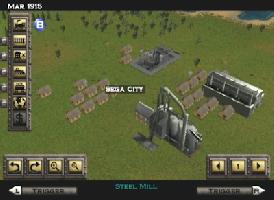 |
| Sega City. Twinned with Hell.
|
I suppose that if you're a fan of these types of simulation you'll get some enjoyment out of Railroad Tycoon 2...but then, if you're a fan of these types of game you're more likely to want to play the PC version (and sequels). Which inevitably loops me back around to my initial comments: who exactly was the Dreamcast port of Railroad Tycoon meant to appeal to? I'd love to know what the final sales figures were for this port if only out of morbid curiosity, but I'd wager they weren't stellar. That said, it was a brave choice to bring this type of game to a console geared as an arcade machine for the home and for that reason I think it has a certain amount of curious charm.
Railroad Tycoon 2 for the Dreamcast, then. A totally capable simulation but a few platforms short of being something I can wholeheartedly recommend to any but the staunchest completist collector.